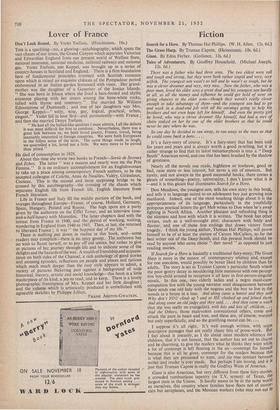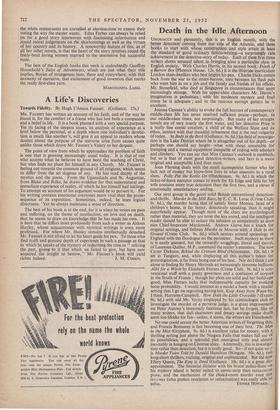Fiction
Tales of Adventurers, By Geoffrey Household. (Michael Joseph. 12s. 6d.) There was a father who had three sons. The two eldest were tall and tough and strong, but they were both rather stupid and very, very selfish. The youngest son wasn't so tall and he wasn't so tough, but he was a clever dreamer and very, very nice. Now the father, who was a poor man, loved his elder sons a great deal and his youngest son hardly at all, so all the money and influence he could get hold of went on giving chances to the elder sons—though they weren't really clever enough to take advantage of them—and the youngest son had to go and work in a dead-end job with all his earnings going to help his brothers and not even hope left for himself. And even the pretty girl he loved, who was a clever dreamer like himself, had had a sort of claim staked on her by one of the older brothers so that he could never be sure where he was.
So one day he decided to run away, to run away to the wars so that he could come back a hero.. .
It's a fairy-story of course. It's a fairy-story that has been told for years and years and is always worth a good re-telling, but it is rather strange to find that its latest metamorphosis is into a " Deep South" American novel, and one that has been brushed by the shadow of greatness.
Nearly all the novels one reads, highbrow or lowbrow, good or bad, raise more or less interest, but never a stir of emotion. But rarely, and not always in the good successful books, there comes a gleam of something—poetry, universality, I don't know what it is —and it is this gleam that illuminates Search for a Hero.
Don Meadows, the youngestsson, tells his own story in this book, and tells it in language suited to an adolescent boy just growing into manhood. Indeed, one of the Most touching things about it is the appropriateness of its language, particularly in the youthfully pompous poetical letters the girl Meb writes to Don when he's away fighting in North Africa. Another pleasant and refreshing thing is the niceness and love with which it is written. The -book has other virtues, such as a well-wrought plot, characters with body and flavour, and one of those fine endings that draws victory from tragedy. I think the young author, Thomas Hal Phillips, will prove himself to be of at least the stature of Carson McCullers, so far the best writer out of the Deep South, and this present book should be read by anyone who cares about " ther novel " as opposed to just reading stories.
If Search for a Hero is basically a traditional fairy-story, The Grass Harp is more in the nature of contemporary whimsy and, except for one anecdote, would possibly be better liked by children than by adults. The story is set in Truman Capote's particular South where the poor gentry decay in mouldering little mansions with one percep- tive boy-child around to recapture it all later in first-person-singular novels. In this one, two elderly ladies and a negro maid-cum- companion live with' the young narrator until disagreement between them sends one old lady with the negress and the boy to live in the woods in a house in a tree. And along came a hunter and they said Why don't YOU climb up ? and so HE climbed up and joined them. And along came an old judge and they said. . . . And then came a witch (but she was really an evangelist), with lots and lots of children. . . • And the Others, those malevolent conventional others, come and attack the pure in heart and tree, and these are, of course, worsted but only superficially, and so the gratifying moral can be....
I suppose it's all right. It's well enough written, with some descriptive passages that are really classy bits of prose-work. But I feel about it uneasily, as I .do about most modern whimsys for children, that it's not honest, that the author has set out to charm and be charming, to give the readers what he thinks they want while a lot of contempt is left floating in the air—contempt for himself because this is all he gives, contempt for the readers because this is what they are presumed to want, and ao true contact between writer and reader is ever made. But perhaps am wrong, and it is just that Truman Capote is really the Godfrey Winn of America.
Giant is also American, but very different from these fairy-stories, a crowded rumbustious tapestry (or T.V. screen) of Texas, the largest state in the Union. It hardly seems to be in the same world as ourselves, this country where families have fleets not of motor- cars but aeroplanes, and the Mexican workers (who may not eat in the white restaurants) are corralled at electionTtimelo ensure their voting the way the master wants. Edna Ferber can always be relied on for a good story interwoven with fascinating information and .sound moral judgements on the shortcomings as well as the virtues of her country and its history. A noteworthy feature of this, as of 'all her other novels, is that the heart of the story revolves round the finely-bred loving women married to the insensitive but successful mate.
The best of the English books this week is undoubtedly Geoffrey Household's Tales of Adventurers; which are just what their titie implies, stories of strangeness here, there and everywhere, with that dexterity of narrative, that excitement of good invention that marks the really first-class yarn.
MAROHANITA LASKI.











































































 Previous page
Previous page